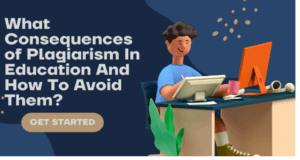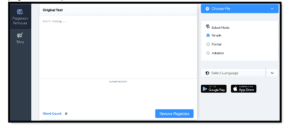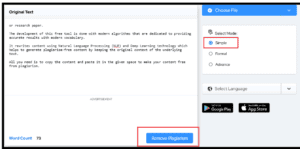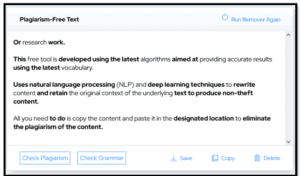Hi guys, thanks for stopping by at my Wonderful blog, we at onlinestudyingservices wish you a great read through our articles. You can link to us, share our Articles and guest what feel free to comment and ask questions on what is bordering you. This way you can interact with us. I will take you into consequences for plagiarism and all you need to know about it..Have a nice read.

There are consequences for plagiarism in academia. So, what are they, and how do you avoid them?
Plagiarism is something that has plagued the literary world for as long as it has existed. Over hundreds of years of human history, a lot of people have been accused of plagiarism. In recent years, the accusations have become even more common.
However, the root of it all goes back to academia. Where a student is learning and if they retort to plagiarism to get through tests, assignments, etc., then the consequences follow them for their lives. So, how do you avoid such problems in the academy and after it? Moreover, what even are these consequences for plagiarism?
On top of that, how do you remove plagiarism and make a habit out of it? To understand all this, let’s dive right into it.
Understanding What Is Plagiarism
Plagiarism is copying an idea, a text—whether entirely or bits of it. This can be done in various ways, and it is important to know how to avoid plagiarizing.
The most common form of plagiarism is when someone copies another person’s work and tries to pass it off as their own. It can also happen when someone paraphrases another author’s text and does not give credit for the idea or information.
It is important to understand what constitutes plagiarism, its various types, why they are unethical, and what steps you can take to avoid committing this act yourself.
- Direct plagiarism is when someone copies a word-for-word from another person’s work. This can be done intentionally or unintentionally.
- Patchwork plagiarism is when someone takes bits and pieces of different texts and edits them together to form their own work.
- Accidental plagiarism is when an author doesn’t know that they are using other people’s words without giving them credit.
Direct plagiarism can be intentional or unintentional, but it is always considered unethical because it deprives the original author of credit for their work. It can also lead to a lawsuit if the original author discovers the plagiarized text after publication.
Patchwork plagiarism is less severe than direct plagiarism because it usually consists of taking bits and pieces from different sources and editing them together to form one’s own text.
Plagiarism in Education
Plagiarism in education is the same, as it’s about using someone else’s work and passing it off as original. It is a form of cheating that can be harmful to both the plagiarist and the plagiarized.
There are many ways in which plagiarism can be harmful in education. For example, if a student copies another person’s work, then they are depriving that person of credit for their work. Using plagiarism in education is a harmful practice, leading to bad grades and even expulsion from the institution.
It is a common practice for students to copy the work of others and submit it as their own. This can be done intentionally or unintentionally. When this happens, it becomes difficult for teachers to differentiate between what is original content and what has been copied from elsewhere.
The Consequences for Plagiarism in Academia
The consequences for plagiarism in academia are severe and can include expulsion and even criminal charges in rare cases.
There are many ways that students plagiarize their work. One way is to copy and paste from a website or another student’s paper. Another way is to paraphrase and use the exact words as the original text, which is also considered plagiarism. But, here are the drawbacks of doing that:
-
Violation Of Academic Codes
Academics have codes, and plagiarism is a violation of each one of them. This violation can cause a few problems, such as:
- Expulsion
- Revoking academic registration
- Revoking or taking away scholarships
These academic codes need you to follow the rules, and that’s why plagiarism is always one of the critical things with severe consequences.
-
Lost Credibility
Credibility is one of the first things you will hurt when you plagiarize content is your own credibility. In academics and in any setting, plagiarizing content will lead to penalties, and losing reliability will always be on top.
-
Career Consequences
When a student plagiarizes content, they are not only harming their studies but are also compromising whatever they learn in the academy. In the long term, their career will be affected when they need the required knowledge later in life.
How To Avoid Plagiarism & Steer Clear Of Such Consequences
Avoiding plagiarism is a straightforward task requiring one to understand original content formulation. But suppose you wish to be double sure before you submit your assignment next time. In that case, you can follow this process to avoid plagiarism:
1. Find A Tool
Finding a tool that helps you check for plagiarism is one thing. However, finding one that helps you remove it entirely is a highly convenient occurrence. That’s what happens when you use this one: the
plagiarism remover we’ll be using for this demonstration does just that. It detects plagiarism and rephrases it.

2. Remove Plagiarism
The second step in the process is to remove plagiarism by simply copying and pasting your content, like this:

Marked in red are the type of modes you can select. Once you do, you will have to click on Remove Plagiarism, which is also marked in red.

You get this once the content is edited and the plagiarism is removed.
3. Edit Content If Needed
Now, this tool might be very convenient, but AI is known to make mistakes or errors sometimes. You can ensure that doesn’t happen by proofreading the changed text and editing if needed.
4. Cite The Sources
Finally, cite the source appropriately. Remember, not citing your sources will also cause any tool to detect plagiarism. Therefore, make sure you cite correctly and quote wherever needed
Our Last Words:
Hi, I hope you enjoy reading through my article, we encourage you to link to us and also share my article.
There are the consequences for plagiarism, how severe it is, and how you can remove it conveniently. We hope this article helps you understand the importance of removing plagiarism from your academic essays. Therefore, use the tool and enjoy original content.
Cheers: Onlinestudyingservices
Share this post on